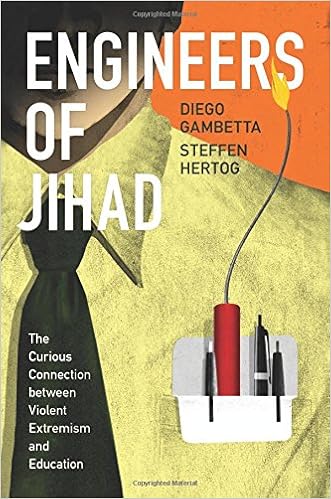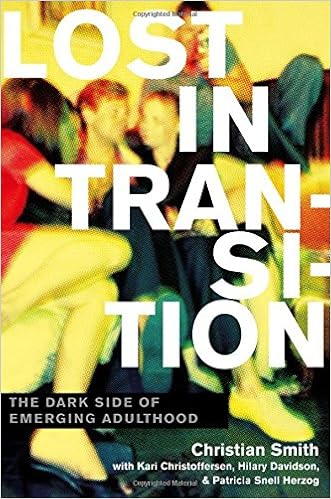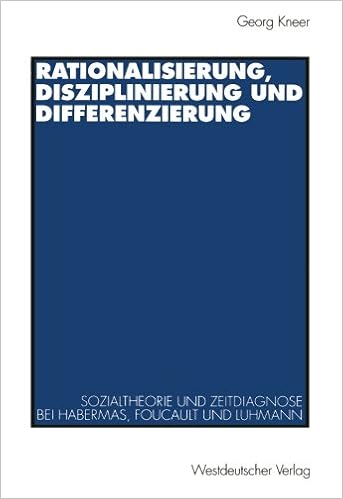
The violent activities of some extremists can adjust the process historical past, but there persists a yawning hole among the capability effect of those contributors and what we comprehend approximately them. In Engineers of Jihad, Diego Gambetta and Steffen Hertog discover unforeseen proof, which they imaginatively leverage to slim that hole: they locate disproportionate percentage of Islamist radicals come from an engineering history, and that Islamist and right-wing extremism have extra in universal than both does with left-wing extremism, within which engineers are absent whereas social scientists and arts scholars are prominent.
Searching for an evidence, they take on 4 normal questions on extremism: less than which socioeconomic stipulations do humans subscribe to extremist teams? Does the profile of extremists replicate how they self-select into extremism or how teams recruit them? Does ideology subject in sorting who joins which workforce? finally, is there a frame of mind vulnerable to particular types of extremism?
Using rigorous equipment and a number of other new datasets, they clarify the hyperlink among academic self-discipline and sort of radicalism via key components: the social mobility (or lack thereof) for engineers within the Muslim global, and a selected mind-set looking order and hierarchy that's chanced on extra usually between engineers. Engineers' presence in a few extremist teams and never others, the authors argue, is a proxy for person features which can account for the a lot higher query of selective recruitment to radical activism.
Opening up markedly new views at the motivations of political violence, Engineers of Jihad yields unforeseen solutions in regards to the nature and emergence of extremism.
Read or Download Engineers of Jihad: The Curious Connection between Violent Extremism and Education PDF
Similar sociology books
Lost in Transition: The Dark Side of Emerging Adulthood
Existence for rising adults is drastically varied at the present time than it used to be for his or her opposite numbers even a iteration in the past. youth are ready longer to marry, to have childrens, and to decide on a profession path. for this reason, they take pleasure in extra freedom, possibilities, and private development than ever sooner than. however the transition to maturity is additionally extra complicated, disjointed, and complicated.
Post yr notice: First released December 1st 2009
-------------------------
Things make us simply up to we make issues. And but, in contrast to the learn of languages or locations, there is not any self-discipline dedicated to the research of fabric issues. This publication indicates why it's time to recognize and confront this forget and what sort of we will be able to examine from focusing our realization on stuff.
The e-book opens with a critique of the concept that of superficiality as utilized to garments. It provides the theories which are required to appreciate the way in which we're created through fabric in addition to social relatives. It takes us contained in the very inner most worlds of our domestic possessions and our approaches of accommodating. It considers problems with materiality on the subject of the media, in addition to the consequences of such an technique in relation, for instance, to poverty. ultimately, the publication considers gadgets which we use to outline what it truly is to be alive and the way we use gadgets to deal with death.
Based on greater than thirty years of study within the Caribbean, India, London and in different places, Stuff is not anything below a manifesto for the learn of fabric tradition and a brand new method of taking a look at the gadgets that encompass us and make up loads of our social and private existence.
Dr. Georg Kneer ist tätig an der Universität Münster.
Subjective Well-Being and Security
Safety, or the perceived lack thereof, affects on caliber of existence at many degrees. a big attention is how safety can be most sensible understood. even supposing definitions of the way to appreciate human protection were proposed, it's not transparent how safety will be measured. safeguard should be analyzed from assorted views i.
- Demanding the Impossible: A History of Anarchism
- The Rise and Fall of Violent Crime in America
- Wild Words from Wild Women: An Unbridled Collection of Candid Observations and Extremely Opinionated Bon Mots
- Sensational Flesh: Race, Power, and Masochism
- Sociology: A Very Short Introduction
Additional info for Engineers of Jihad: The Curious Connection between Violent Extremism and Education
Example text
There are, according to him, three distinct forms of knowing which, though they all have a permanent ground in life and coexist in all societies, none the less exist or predominate at different times and places in different proportions: religious knowledge; metaphysical knowledge; and scientific knowledge. To these three forms of knowing correspond three types of man who act as their carriers: the homo religiosus, seer or saint; the sage or thinker or philosopher; and the scientist or re searcher.
Indeed, they are quite likely to be doctrinaire; there is something in the professorial mode of life which tends to make professors (even English and American ones) into men of principle. Bureaucrats, on the other hand, are forced to be realistic: they are near the seat of power and must produce feasible solutions to practical problems. In a word, the thoughtprocesses of the academic man are entirely different from those of the permanent civil servant, and they are so different because they have gone through a different organizational mill.
Bureaucrats, on the other hand, are forced to be realistic: they are near the seat of power and must produce feasible solutions to practical problems. In a word, the thoughtprocesses of the academic man are entirely different from those of the permanent civil servant, and they are so different because they have gone through a different organizational mill. 1 Some good material is to be found in Justus Hashagen’s contribution to Versuche zu einer Soziologie des Wissens, 1924, esp. 240-4. The subject under dis cussion is historical scholarship.



